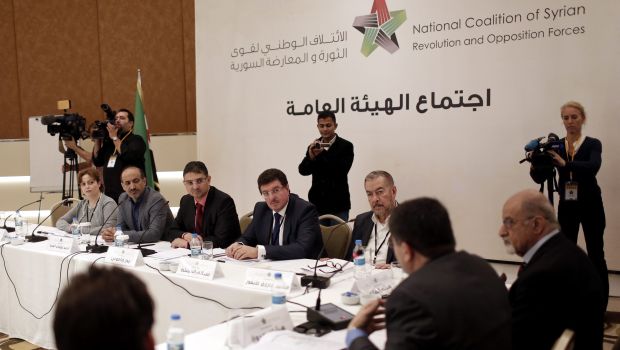As the Syrian National Coalition readies itself for a new round of meetings in Istanbul, there will be a number of key issues on the agenda.
The first, a political one, poses a challenge not only for the coalition but for the entire Syrian opposition, and for all Syrians as a whole: The Coalition’s General Authority must take a clear and specific position on whether or not it will participate in the upcoming Geneva II meetings.
The second, an organizational issue, regards outlining the Coalition’s main features, determining the nature of its institutions and internal relations, as well as the political circles it operates within.
The third, and the most important, is the election of the Coalition’s leaders. The Coalition is due to elect its president, three deputies and an undersecretary who will form its presidential body. Other members will also be elected to this body.
But many other significant issues will also be discussed by the members of the Coalition.
These will include the current political and military developments within Syria, particularly when it comes to the fighting between the various groups and factions involved, most notably between the Islamic State of Iraq and Syria (ISIS) and the Free Syrian Army (FSA).
Also to be discussed will be the initial performance of the new Syrian interim government headed by Ahmad Toumeh, the relationships among the Syrian opposition forces in light of the prospects for convening Geneva II, and the feasibility of the opposition’s participation. Attendants will also discuss the Coalition’s legal committee and media bureau, which have not seen any changes, nor are they yet to be assessed by the Coalition, since their inception a year ago—a discussion which has become necessary in light of the changes within the Coalition itself.
What is new this year is the consensus among Coalition members given the growing collective awareness of how serious things have become—not only regarding the Coalition but the entire opposition. The most important of these factors is the escalating policy of murder, destruction and displacement adopted by the Assad regime, as well as the involvement of its stooges and allies like Russia, Iran, and the Shi’ite militias of Hezbollah and the Abu Fadl Al-Abbas Brigade, among others. These forces have effectively become foreign occupying powers in Syria, politically, militarily and economically supporting the Syrian government and thereby complicit in the killing and displacement of thousands of people and the destruction of their country. Add to this the growing influence of religious and ethnic extremist groups such as ISIS, the Al-Nusra Front, and the People’s Protection Units (YPG) led by the Kurdish Democratic Union Party (PYD), as well as the negative changes in the international community’s stance towards the Syrian revolution, and we can see how serious things have become.
Based on the atmosphere within the Coalition, the discussions this time should run smoothly, something which has never happened before. During the last meeting, three highly problematic issues were submitted: the formation of an interim Syrian government, the inclusion of the National Kurdish Council (KNC) into the Coalition, and the prospect of the Coalition’s participation in Geneva II.
However, this is not to suggest that the expected positive atmosphere and consensus will rule out the possibility of heated debates during the meetings. These issues are normal in any political body or coalition. However, differences this time should be within reasonable limits. If this is the case—and I think it will be—the Coalition will in the future be much more capable of organizing its internal affairs and its external relationships. It will therefore be able to go one step further by practising its duties and administrating the conflict with Assad much more effectively than before. This is not to suggest that it will live up to the level required to address the Syrian crisis, which indeed has taken alarming regional and international dimensions.
While it should be otherwise, Syrians have become the least influential force within the Syrian crisis. This is something which Syrians, particularly the Coalition, have to address in the future.
